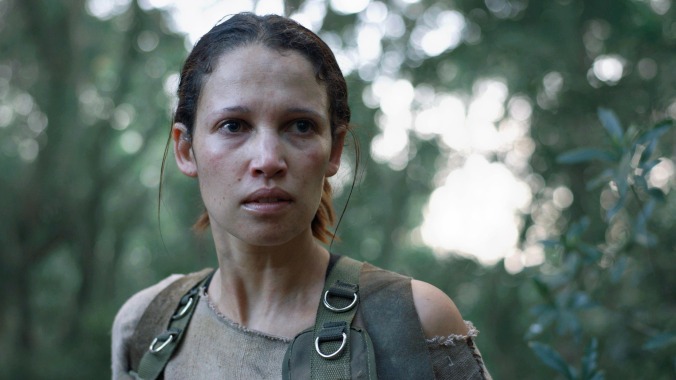Something must be in the air right now. Maybe it’s the pollution. Just two months ago, Ben Wheatley whispered sour nothings to the trees with his COVID-quickie psychedelic thriller In The Earth. Now along comes another ecological horror movie—shot at least partially during the pandemic and released at least nominally through Neon—that pits a park ranger against a zealot with a bow and arrow, a mighty woodland god(dess), and a gnarly injury to the foot. Horror has a habit of converting the anxieties of the day into fresh scares, like a plant making food out of light and water. Do a double feature of these complimentary (and comparably imperfect) environmental nightmares and the anxiety filtered by both becomes clear: Mother Nature is pissed.
Per modern genre trends, Gaia opens with two kinds of drone: As the camera glides ominously over the treetops, observing the South African wilderness from a godlike (ahem) elevation, the music whines and throbs with familiar atonal dread. But this isn’t entirely one of those slow burns that delight festivalgoers and enrage multiplex crowds. After all, only a few minutes pass before ranger Gabi (Monique Rockman) wanders into the foliage, loses contact with her colleague (Anthony Oseyemi), and steps on something pointy. To her rescue come a pair of mud-caked survivalists: Barend (Carel Nel) and his teenage son, Stefan (Alex van Dyk), who have a shack in the woods, where they handcraft everything from their clothes to their weapons. To say they’re roughing it would be an understatement; the two don’t just live off the land, they live in fear of it—or more specifically, of a strange organism nestled in its soil.
Wheatley’s movie was a creature feature only in the abstract sense. You couldn’t really see its eco-mythological threat, a veritable vegetable lord that just sort of was the trees, man. (Whoa.) In Gaia, it’s a humongous fungus that turns on the strobe lights in everyone’s head. What’s worse, it goes for the mind and the body, transforming human hosts into blind, staggering, clicking zombies that bear an unmistakable resemblance to the ones in the Last Of Us games, down to the way they spread their disease through clouds of spores. And if that’s not bad enough, Gabi has to contend with the dawning realization that her host might be on the shroom’s side: The bearded luddite has built a religion around the entity; he’s the Joseph Smith of fungus worshippers, and Nel, the actor playing him, gets one great scene of country-preacher proselytizing—a juicy down-with-mankind monologue as exciting as any of the action scenes chaotically orchestrated by TV-veteran director Jaco Bouwer.
One might be tempted to describe Gaia as a distant, green-friendly relative of Night Of The Living Dead, given how much of the film is just a handful of characters trapped in close quarters, the simmering unease inside as potentially dangerous as the monsters outside. But such a comparison would imply more tension and claustrophobia than what we get here. The script, by Tertius Kapp, hints at a blossoming sexual attraction between the virginal Stefan and his injured guest, but that goes nowhere. The conflict mostly comes down to the boy’s repressed desire to see the world versus his father’s fervent belief that the world is doomed—a theoretically resonant friction that’s neutralized by van Dyk’s wordless, narcotized performance. (His Stefan is about as animated as a Portobello.) Even when the story takes on biblical overtones, the melodrama never blossoms. And in terms of suspense, Gaia doesn’t so much tighten the screws as endlessly turn them in the wrong direction.
At least the effects, many achieved via prosthetics as opposed to computers, are cool. Besides the ghouls, there’s some uniquely discomforting body horror, as characters scratch at wounds that have sprouted stems, caps, and gills. Less effective if plenty striking are the flashes of bad-trip reverie, all dreams seeded within dreams and haunting visions provoked by the UFO-red glow of what lies beneath. Gaia might not creep under the skin as insidiously as a hostile fungus, but it should play well to the mental state of anyone with mushrooms on the mind, so to speak. What’s another word for elevated?


 Keep scrolling for more great stories from The A.V. Club.
Keep scrolling for more great stories from The A.V. Club.